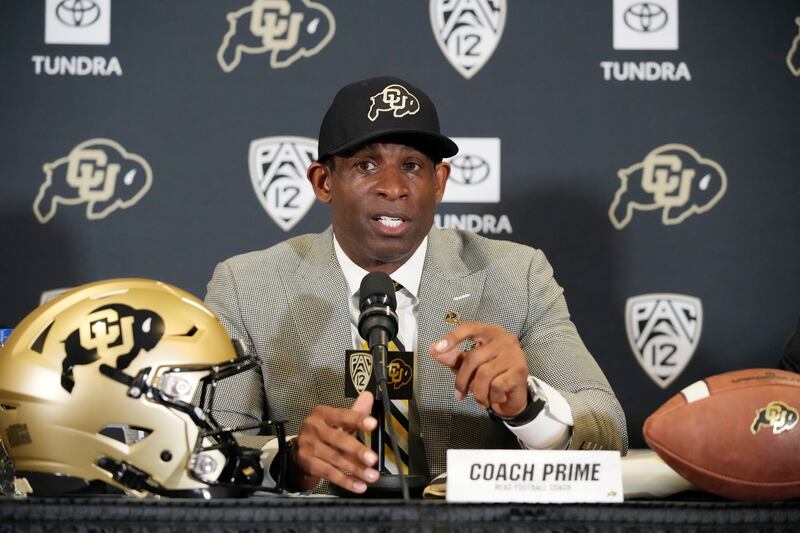Less than three months after joining the University of Colorado’s football program, coach Deion Sanders has gotten his new employer tangled up in a religious freedom fight.
Since January, two faith-related organizations have contacted the school about Sanders’ religious habits. One alleged that he and some of his staff members were breaking the law by praying with players, while the other warned the school that it could be violating Sanders’ religious rights.
The drama began in January, when the Freedom from Religion Foundation sent the University of Colorado a letter about Sanders’ habit of regularly referencing Christianity during school events. The organization said it had been contacted by multiple Colorado residents who were aware of — and concerned about — players being pressured to pray during team meetings.
“The Supreme Court has continually struck down school-sponsored proselytizing in public schools,” argued the foundation’s staff attorney, Christopher Line, in the letter.
Line concluded that Sanders was violating the Constitution’s religious freedom protections.
“The University of Colorado must take action to protect its student athletes and to ensure that Sanders understands that he has been hired as a football coach and not a pastor,” he wrote.
One week later, the school responded, highlighting the steps it had taken to address the Freedom from Religion Foundation’s concerns.
Patrick T. O’Rourke, the school’s executive vice chancellor and chief operating officer, wrote that the school’s Office of Institutional Equity and Compliance met with Sanders to educate him about when and where coaches and players can engage in religious expression.
“Coach Sanders was very receptive to this training and came away from it with a better understanding of the University of Colorado’s policies and the requirements of the Establishment Clause,” O’Rourke said.
He added that, if the Freedom from Religion Foundation hears from Colorado football players in the future, it should direct them to the Office of Institutional Equity and Compliance.

If school officials considered the mattered resolved at that point, they were mistaken. Just this week, the University of Colorado was contacted by a separate organization claiming that the school had unlawfully censored Sanders’ religious speech.
“We write to correct the Freedom from Religion Foundation’s (FFRF’s) misstatements regarding the requirements imposed by the First Amendment on public school employees’ religious expression. The Supreme Court has repeatedly held that public school employees may engage in religious expression and exercise; therefore, public universities like CU may not target Coach Sanders (or other members of the football staff) for exercising constitutional rights on campus,” read the letter from First Liberty Institute, a law firm focused on religious freedom cases.
The letter repeatedly references a 2022 Supreme Court case, Kennedy v. Bremerton, centered on a high school football coach who fought to pray at the 50-yard line after games. In June, the Supreme Court ruled 6-3 in his favor, deciding that coaches can engage in personal prayers even when students and other observers are nearby.
“Supreme Court precedent is clear that public school employees may engage in religious expression and exercise,” the First Liberty letter said.
It concluded by asking Colorado officials to allow Sanders to engage in religious expression and to send First Liberty more information about the school’s approach to religious rights.
The firm specifically asked for a copy of the school’s nondiscrimination policies, as well as all documents related to the Freedom from Religion Foundation’s complaint.
The unfolding conflict at Colorado has much in common with past school prayer cases, which stem from disagreements about what the First Amendment’s establishment clause requires of public schools.
Some religious freedom advocates argue that institutions should err on the side of allowing coaches, teachers and other authority figures to engage in religious practices, while others say it’s essential to protect impressionable students.
Unsurprisingly, given this background, the Supreme Court’s June ruling on school prayer was contentious. It resolved the high school coach’s case, but did not lead to a new consensus on when religious expression in schools is OK.
Like the national debate over school prayer, the situation at Colorado remains unresolved. First Liberty only just sent its letter to school officials on Tuesday, Feb. 28.
For his part, Sanders continues to stir up controversy, although the latest debate does not involve religious rights. The coach has faced criticism this week for saying recently that he only recruits quarterbacks from “dual-parent” homes, but looks for defensive lineman from poorer, single-parent homes.
And on social media, at least, Sanders continues to talk regularly about his faith in God.
“Be on the lookout for a major blessing from God,” the coach tweeted on Feb. 26.


